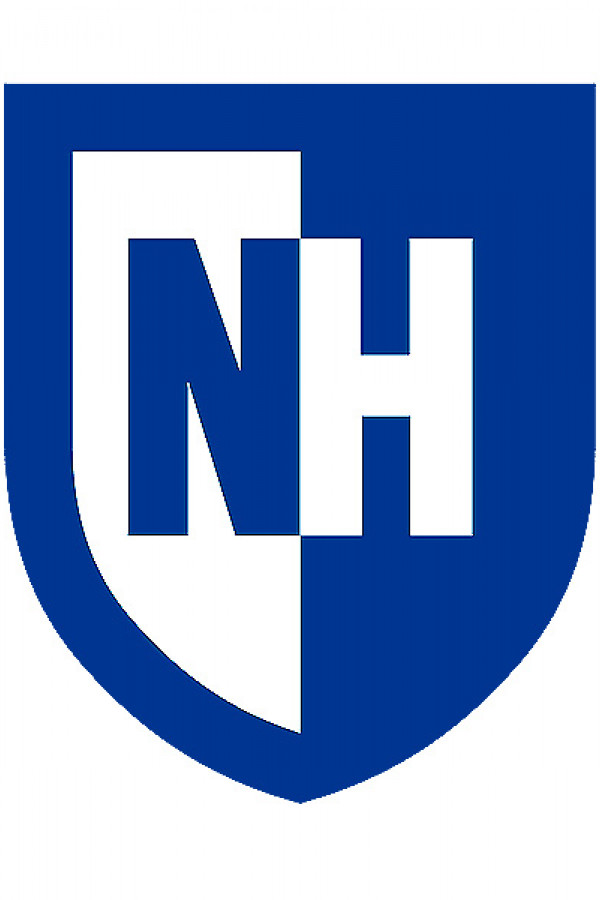The Information Technology major at UNH offers comprehensive training for today’s rapidly evolving digital landscape. Here you'll be able to learn programming fundamentals and IT applications and develop technical problem-solving abilities valuable across industries.
What is a Bachelor of Science in information technology?
This program is tailored to students who want to apply computer technologies toward satisfying the information needs of individuals and organizations. The curriculum is rooted in fundamentals; students gain the skills and knowledge needed to enter this ever-changing field with confidence. With a solid foundation in science, students also develop strong programming and problem-solving skills, as well as abstract thinking. The IT program arms graduates with the know-how they’ll bring to professional positions upon graduation and, eventually, in leadership positions in their field.
Why study information technology at UNH?
You’ll have access to the UNH InterOperability Lab, where you’ll test the networking equipment of top technology companies, gaining real-world training and experience. And, you’ll have the opportunity to conduct research through capstone projects and independent studies. Many of UNH’s student organizations are a natural fit for IT majors, such as the Cyber Security Club, the Linux Club, and Wildcat Women in Computer Science. Plus, the Programming Assistance Center offers walk-in support and tutoring.
Potential Careers
- Application developer
- Cloud architect
- Computer support specialist
- Data center support specialist
- Data quality manager
- Database administrator
- Desktop support manager/specialist
- Information security analyst
- Information technology specialist
- Java developer
- Network administrator
- Network specialist
- Programmer
- Software developer
- Web developer
Curriculum & Requirements
Information technology is concerned primarily with the application of existing computing technologies to the information needs of organizations and individual computer users. The IT program aims to provide graduates with the skills and knowledge to take on appropriate professional positions in information technology upon graduation and grow into leadership positions in the field. Potential careers include network administrator, database developer, system administrator, and webmaster.
The broad objectives for B.S. in information technology graduates are:
- Apply the full range of core IT concepts and techniques to fill the IT needs of an organization and be prepared to assume managerial and other advanced responsibilities,
- Confront new problems effectively and anticipate the changing directions of technology,
- Communicate effectively with diverse stakeholders as well as function appropriately in a team environment,
- Navigate within the complex relationships between IT and larger organizational goals, and
- Understand the pervasive and changing role of computing technology in global society, and participate responsibly as both IT professional and citizen.
The B.S. in information technology program is accredited by the Computing Accreditation Commission of ABET.
Sample Degree Plan
This sample degree plan serves as a general guide; students collaborate with their academic advisor to develop a personalized degree plan to meet their academic goals and program requirements.
| First Year | ||
|---|---|---|
| Fall | Credits | |
| CS 400 | Introduction to Computing | 2 |
| CS 415 | Introduction to Computer Science I | 4 |
| IT 403 | Introduction to Internet Technologies | 4 |
| MATH 425 | Calculus I | 4 |
| Discovery | 4 | |
| Credits | 18 | |
| Spring | ||
| CS 417 | From Programs to Computer Science | 4 |
| ENGL 401 | First-Year Writing (Discovery) | 4 |
| Discovery | 4 | |
| Physical Science (DLAB) | 4 | |
| Credits | 16 | |
| Second Year | ||
| Fall | ||
| IT 505 | Integrative Programming | 4 |
| IT 520 | Foundations of Information Technology | 4 |
| CS 501 | Professional Ethics and Communication in Technology-related Fields | 4 |
| Discovery | 4 | |
| Credits | 16 | |
| Spring | ||
| CS 518 | Introduction to Software Engineering | 4 |
| CS 527 | Fundamentals of Cybersecurity | 4 |
| MATH 539 | Introduction to Statistical Analysis | 4 |
| Biological Science (DLAB) | 4 | |
| Credits | 16 | |
| Third Year | ||
| Fall | ||
| IT 609 | Network/Systems Administration | 4 |
| IT 705 | Project Management for Information Technology | 4 |
| IT Elective (1 of 3) | 4 | |
| Minor (1 of 5) | 4 | |
| Credits | 16 | |
| Spring | ||
| IT 699 | Internship | 1 |
| IT 775 | Database Technology | 4 |
| Minor (2 of 5) | 4 | |
| Discovery | 4 | |
| Free Elective | 4 | |
| Credits | 17 | |
| Fourth Year | ||
| Fall | ||
| IT 791 | Senior Project I | 2 |
| IT Elective (2 of 3) | 4 | |
| Minor (3 of 5) | 4 | |
| Discovery | 4 | |
| Free Elective (optional) | ||
| Credits | 14 | |
| Spring | ||
| IT 792 | Senior Project II | 2 |
| IT Elective (3 of 3) | 4 | |
| Minor (4 of 5) | 4 | |
| Minor (5 of 5) | 4 | |
| Free Elective or Fourth Writing Intensive | 4 | |
| Credits | 18 | |
| Total Credits | 131 | |
Degree Requirements
All Major, Option and Elective Requirements as indicated.
*Major GPA requirements as indicated.
Major Requirements
Information technology majors must maintain an overall grade-point average of 2.0 or better in all required information technology and computer science required courses in order to graduate. If at the end of any semester, including the first, a student's cumulative grade-point average in these courses falls below 2.0, the student may not be allowed to continue as an IT major. In order to meet the IT major requirements, the following courses must be passed with a grade of C- or better: CS 410P, CS 410C, CS 414, CS 415, CS 416, CS 417, IT 403, IT 505, IT 520.
If a student wishing to transfer into the information technology major has any coursework that is applicable to the major, the grades in those courses must satisfy the minimum grade requirements for the B.S. degree in information technology. The student must have an overall grade-point average of 2.0 or better in all courses taken at the University.
In addition to the core IT requirements, each student must complete a complementary set of courses in a particular domain outside of IT to which the student's IT skills can be applied. This set of courses can be completed in one of the following ways: (1) An approved minor; or (2) A second major or UNH dual degree. A list of preapproved minors is available from the CS Department and requires at least (5) courses to complete.
Required Courses
| Code | Title | Credits |
|---|---|---|
| Information Technology Courses | ||
| CS 400 | Introduction to Computing | 2 |
| CS 415 | Introduction to Computer Science I 1 | 4 |
| or CS 410C | Introduction to Scientific Programming/C | |
| or CS 410P | Introduction to Scientific Programming/Python | |
| or CS 414 | ||
| CS 417 | From Programs to Computer Science 1 | 4 |
| CS 501 | Professional Ethics and Communication in Technology-related Fields | 4 |
| CS 518 | Introduction to Software Engineering | 4 |
| CS 527 | Fundamentals of Cybersecurity | 4 |
| IT 403 | Introduction to Internet Technologies | 4 |
| IT 505 | Integrative Programming | 4 |
| IT 520 | Foundations of Information Technology | 4 |
| IT 609 | Network/Systems Administration | 4 |
| IT 699 | Internship | 1 |
| IT 705 | Project Management for Information Technology | 4 |
| IT 775 | Database Technology | 4 |
| IT 791 & IT 792 | Senior Project I and Senior Project II | 4 |
| IT Electives | ||
| Select three courses from the following: | 12 | |
IT 502 | Intermediate Web Design | |
IT 604 | Server-side Web Development | |
IT 605 | Full-Stack Web Development | |
IT 612 | Scripting Languages | |
IT 630 | Data Science and Big Data Analytics | |
IT 666 | Cybersecurity Practices | |
IT 718 | Cloud Computing Principles | |
IT 725 | Network Technology | |
IT 780 | Topics in Information Technology | |
| Mathematics Courses | ||
| MATH 425 | Calculus I | 4 |
| MATH 539 | Introduction to Statistical Analysis | 4 |
| Science Courses 2 | ||
| One Discovery Biological Science (BS) with Discovery Lab | 4 | |
| One Discovery Physical Science (PS) with Discovery Lab | 4 | |
| Other Courses | ||
| Discovery requirements not already covered by required courses | 24 | |
| General Electives | 6-8 | |
| Minor, Second Major, or Dual Degree | 20 | |
| Total Credits | 129-131 | |
- 1
Starting in 2022-2023, all Information technology majors will be recommended to take CS 415 Introduction to Computer Science I and CS 417 From Programs to Computer Science as their two-semester sequence. CS 414 will be discontinued starting Fall 2022.
- 2
Courses must carry the Discovery attributes of Biological Science or Physical Science and include Discovery lab (DLAB).
Program Learning Outcomes
Students will be able to:
- Analyze a complex computing problem and to apply principles of computing and other relevant disciplines to identify solutions.
- Design, implement, and evaluate a computing-based solution to meet a given set of computing requirements in the context of the program’s discipline.
- Communicate effectively in a variety of professional contexts.
- Recognize professional responsibilities and make informed judgments in computing practice based on legal and ethical principles.
- Function effectively as a member or leader of a team engaged in activities appropriate to the program’s discipline.
- Identify and analyze user needs and to take them into account in the selection, creation, integration, evaluation, and administration of computing-based systems.
- Self-learning skills, exposure to technologies new to the students, practice in understanding those technologies on their own.
Explore Program Details
The B.S. in information technology program is accredited by the:
Computing Accreditation Commission of ABET
111 Market Place, suite 1050
Baltimore, MD
21202-4012
Phone: (410) 347-7700
www.abet.org
In addition to the core IT requirements, each student must complete a complementary set of courses in a particular domain outside of IT to which the student's IT skills can be applied. This set of courses can be completed in one of the following ways:
- A pre-defined second discipline*;
- A self-defined second discipline approved by the IT Program Coordinator;
- An approved minor**;
- A second major or UNH dual degree.
*Four (4) second disciplines have been defined by the CS department, requiring (4) courses in such areas as business administration, entrepreneurship, health management and policy, and justice studies.
Student-Designed Second Discipline
**An approved list of minors is available from the CS Department and requires (5) courses to be completed.
Information Technology majors must maintain an overall grade-point average of 2.0 or better in all required information technology, computer science, mathematics courses in order to graduate. If at the end of any semester, including the first, a student’s cumulative grade-point average in these courses falls below 2.0, the student may not be allowed to continue as a IT major.
The following courses must be passed with a grade of C- or better: IT 403, CS 410, CS 414, CS 415, CS 416, CS 417, IT 502, and IT 505. If a student wishing to transfer into the information technology major has any coursework that is applicable to the major, the grades in those courses must satisfy the minimum grade requirements for the B.S. degree in information technology. The student must have an overall grade-point average of 2.0 or better in all courses taken at the University.
As a guide to course selection students may use either of the following sets of guidelines:
Those interested in the Information Technology major may also be interested in the following advanced degrees. Students in the program also have the opportunity to participate in the UNH accelerated master’s program.
























